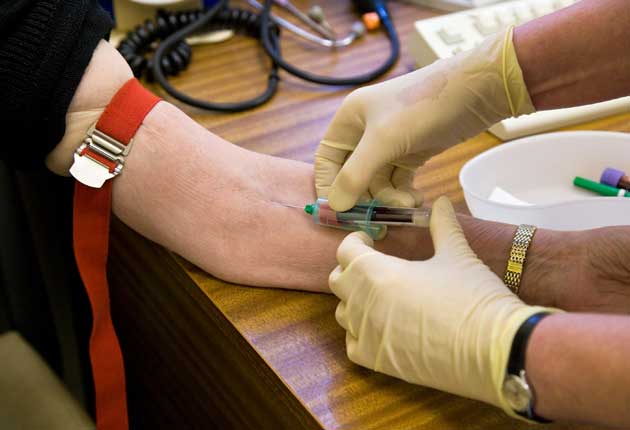Blood test offers hope to cancer sufferers
DNA analysis will enable doctors to pinpoint whether treatment is working

Doctors may soon be able to tell whether cancer has been successfully eliminated from the body using a sensitive blood test that could dramatically change the way they are able to monitor the recovery of their patients.
The blood test, which detects the presence of the smallest amounts of defective DNA shed by cancerous cells, can show how well cancer patients are responding to successive courses of treatment.
Cancer treatment is difficult to monitor at present and usually involves cumbersome and expensive hospital scanners. A blood test that can check different stages of remission will be an invaluable tool in determining whether treatment has worked, scientists said.
Each test is tailor-made for an individual patient and works by identifying gross changes to the patient's DNA that occur during cancer. This "personalised" test distinguishes between a patient's healthy DNA and that which has changed as a result of a cancerous growth, giving scientists a way of seeing if a treatment is succeeding. The researchers predict that the test could soon be used routinely in the battle against the killer disease.
Although such "personalised medicine" based on sequencing a person's unique genome is still expensive – about £3,500 – the scientists believe the test will eventually become no more expensive, but much more effective, than current methods of monitoring cancer treatment.
"Eventually, we believe this type of approach could be used to detect recurrent cancers before they are found by conventional imaging methods, like CT scans," said Luis Diaz, assistant professor of oncology at Johns Hopkins Kimmel Cancer Centre in Baltimore.
Victor Velculescu, another Johns Hopkins scientist involved in the study, presented yesterday at the American Association for the Advancement of Science in San Diego, said: "There is currently no test for cancer patients that provides personalised biomarkers for clinical management of disease, and we feel that this is an important step in bringing new genome sequencing technologies to personalised patient care."
The technique, called personalised analysis of rearranged ends (Pare), differs from previous investigations of the genomes of cancer cells by looking at gross rearrangements of whole chunks of DNA rather than individual mutations in the "letters" of the genome.
Bert Vogelstein, of the Howard Hughes Medical Institute in Baltimore, said: "These alterations, like the reordering of chapters of a book, are easier to identify and detect in the blood than single-letter [genome] changes."
The scientists tested the Pare technique on six sets of cancerous and normal tissue samples taken from four patients with colorectal cancer and two with breast cancer. They found between four and 15 DNA rearrangements in each of the six samples.
The researchers were able to show how levels of the cancer-linked DNA in the blood fell after the initial surgery to remove the tumour, and subsequent bouts of radiation treatments, chemotherapy and secondary surgery.
Rebecca Leary, a member of the research team, said the aim was to develop a highly sensitive method of detecting any residual cancer that may be left after a course of treatment.
"As Pare becomes affordable, it will [help] physicians to tailor patient care and may become a useful supplement to traditional monitoring by imaging or other approaches," Dr Leary said.
Peter Johnson, Cancer Research UK's chief clinician, said: "The detection of DNA changes, unique to individual cancers, has proved a powerful tool in guiding the treatment of leukaemia. If this can be done for other types of cancer, like bowel, breast and prostate, it will help us bring new treatments to patients better and faster than ever."
Subscribe to Independent Premium to bookmark this article
Want to bookmark your favourite articles and stories to read or reference later? Start your Independent Premium subscription today.

Join our commenting forum
Join thought-provoking conversations, follow other Independent readers and see their replies